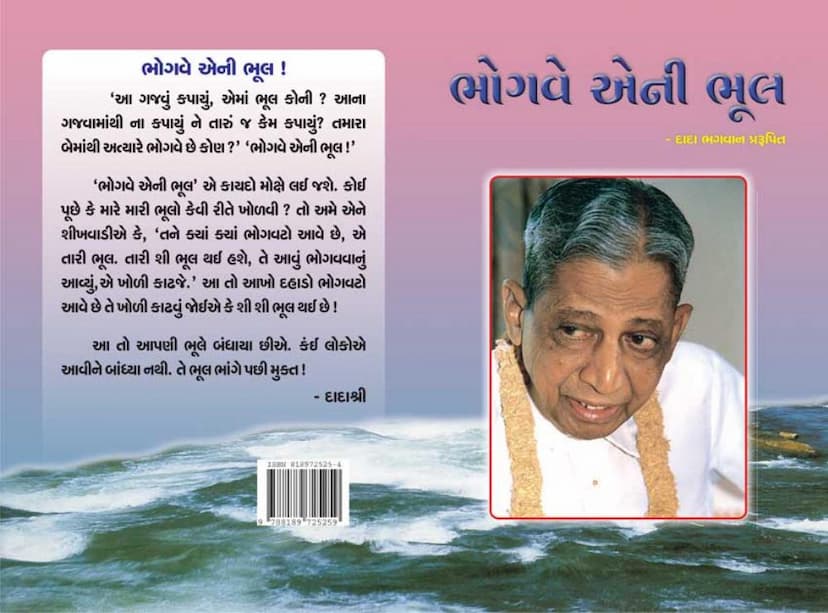Bhogve Eni Bhul
Added to library: September 1, 2025

Summary
This Jain text, titled "Bhogve Eni Bhul" (He Who Experiences, It Is His Fault), attributed to Dada Bhagwan, expounds a fundamental principle of Jainism for spiritual liberation. The central message is that whatever suffering or consequence one experiences, it is due to their own past mistakes or faults.
Here's a comprehensive summary of the key points presented in the text:
1. The Core Principle: "Bhogve Eni Bhul" The entire book revolves around this singular, profound principle. It's presented as a universal law that governs all experiences, especially those that are painful or undesirable. The text emphasizes that this understanding is a direct path to liberation (moksha).
2. Identifying One's Faults: The book guides the reader on how to find their own faults. The method is straightforward: observe where you are experiencing suffering or adverse consequences. That area of suffering is a direct indication of where your fault lies. Instead of blaming others or external circumstances, one should introspect and understand what mistake led to that particular experience.
3. The Illusion of Blame and Justification: The text highlights the common human tendency to blame others or to justify one's own actions when facing negative experiences. People often rationalize by thinking, "If they hadn't done X, I wouldn't have had to do Y." This self-deception and outward blame only serve to create new karmic bondage and perpetuate suffering.
4. The Natural Justice System: Dada Bhagwan explains that the world operates under a natural justice system, which is impartial and just. Unlike human courts, this cosmic law is perfect. The core of this cosmic law is "Bhogve Eni Bhul." This law assigns consequences based on individual actions and does not falter.
5. The Role of Circumstances and "Nimit": The text clarifies that external people or events are merely "nimitt" (instruments or catalysts). They are not the actual cause of one's suffering. The real cause lies within oneself, in the accumulated karmas from past mistakes. Even if someone acts incorrectly towards you, the fact that you are experiencing the negative consequence means there was a prior fault on your part that attracted this interaction.
6. The Importance of Self-Responsibility: The book strongly advocates for complete self-responsibility. It asserts that no one else can cause harm or suffering to you unless there is a karmic account or a fault within you that attracts it. Therefore, instead of getting angry or resentful towards the "nimitt," one should accept the experience as the result of their own past actions.
7. Understanding the "Why": When faced with hardship, instead of asking "Why is this happening to me?" the enlightened approach is to ask, "What is my fault that has led to this?" This shifts the focus from external blame to internal introspection and correction.
8. Liberation Through Understanding: By consistently applying the principle "Bhogve Eni Bhul," one gradually purifies their understanding and actions. This leads to the dissolution of karmic accounts and ultimately to liberation. The text suggests that even writing this phrase in one's home and contemplating it can be a powerful tool for spiritual progress.
9. The Limitations of Intellectual Understanding: While intellectual understanding is a start, the true power lies in experiencing and living by this principle. The text implies that a true "Jnani Purush" (Self-Realized being) embodies this understanding so completely that they are free from blame and suffering.
10. Examples and Analogies: The book uses various analogies and examples to illustrate the principle, such as a stolen purse, a broken teacup, a drunkard son, a bus accident, and a stone hitting someone. These examples help to solidify the understanding that the person experiencing the consequence is the one whose fault it is.
11. The "Akram" Path: The teachings are presented within the context of the "Akram" (instantaneous) path of spiritual liberation, as revealed by Dada Bhagwan. This path emphasizes understanding and internalizing the truth rather than following rigid rituals.
In essence, "Bhogve Eni Bhul" is a profound spiritual treatise that teaches self-awareness, self-responsibility, and the acceptance of one's experiences as a direct consequence of their own actions, offering a clear path to inner peace and eventual liberation from the cycle of suffering.